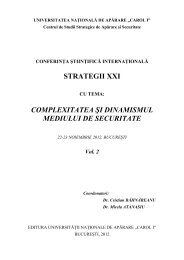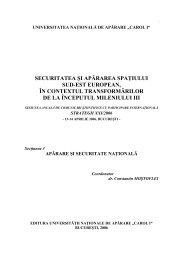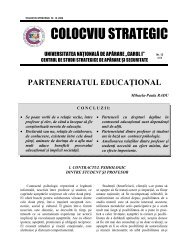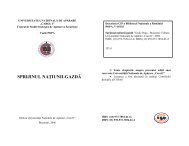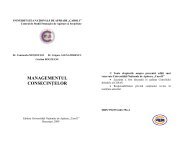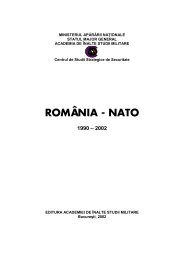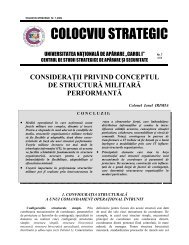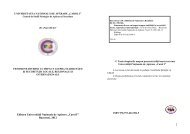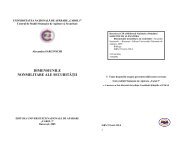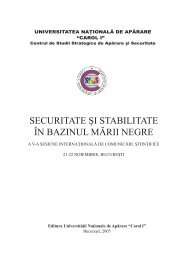- Page 1 and 2:
UNIVERSITATEA NAŢIONALĂ DE APĂRA
- Page 3 and 4:
CUPRINS SECŢIUNEA 1: ASPECTE NOI
- Page 5 and 6:
CONTEXTUL APARIŢIEI DIPLOMAŢIEI A
- Page 7:
SECŢIUNEA 1: Aspecte noi în evolu
- Page 10 and 11:
Marshall, cât şi prin alte mijloa
- Page 12 and 13:
ajutorului umanitar, după ce ar fi
- Page 14 and 15:
accesului la surse de energie, star
- Page 16 and 17:
În spiritul creşterii eficienţei
- Page 18 and 19:
NATO colaborează în mod activ cu
- Page 20 and 21:
poate spune că teoriile nu au infl
- Page 22 and 23:
1. Paradigma realistă Realismul a
- Page 24 and 25:
moment o paradigmă a relaţiilor i
- Page 26 and 27:
Barry Buzan defineşte termenul de
- Page 28 and 29:
ameninţările, în vreme ce realis
- Page 30 and 31:
Aceasta perspectivă teoretică se
- Page 32 and 33:
Kauppi identifică patru asumpţii
- Page 34 and 35:
Constructivismul nu respinge toate
- Page 36 and 37:
„Şcoala de la Copenhaga” le-am
- Page 38 and 39:
conceptuală a securităţii: reali
- Page 40 and 41:
ŞTIINŢĂ-TEHNOLOGIE-INOVAŢIE ŞI
- Page 42 and 43:
parteneriat global pentru dezvoltar
- Page 44 and 45:
internaţionale începând cu a dou
- Page 46 and 47:
În Raportul Forumului Economic Mon
- Page 48 and 49:
omului; aparat de securitate ce ope
- Page 50 and 51:
13. SACHS, Jeffrey D., From Milleni
- Page 52 and 53:
1. Riscuri şi ameninţări 1.1. Ev
- Page 54 and 55:
puteri care negociază cu Teheranul
- Page 56 and 57:
dintre Tokyo şi Beijing s-a declan
- Page 58 and 59:
foarte serioasă pentru sănătatea
- Page 60 and 61:
infrastructură din Estonia, fapt c
- Page 62 and 63:
Practic, doar parteneriatul strateg
- Page 64 and 65:
1. În secolul XIX şi prima parte
- Page 66 and 67:
de hegemon unic şi să accepte com
- Page 68 and 69:
ogate în resurse energetice. Prin
- Page 70 and 71:
Ca urmare, Statele Unite trebuie s
- Page 72 and 73:
3.4. Rusia Rusia, pare un adversar
- Page 74 and 75:
Concluzii Noua structură de putere
- Page 76 and 77:
FUNDAMENTELE PROTECŢIEI INFRASTRUC
- Page 78 and 79:
Perimetrul obiectivului reprezintă
- Page 80 and 81:
pentru impunerea măsurilor destina
- Page 82 and 83:
Creşterea măsurilor dinamice de p
- Page 84 and 85:
constituirea proiectului vor fi pre
- Page 86 and 87:
posibilităţii de acţiune în vii
- Page 88 and 89:
de posibilităţile structurii trim
- Page 90 and 91:
de contracarare a factorilor de ame
- Page 92 and 93:
3.6. Evacuarea Evacuarea se referă
- Page 94 and 95:
INTEROPERABILITATEA STRUCTURALĂ Ş
- Page 96 and 97:
Distorsiunea presupune o modificare
- Page 98 and 99:
diseminarea informaţiilor în form
- Page 100 and 101:
- creşterea exponenţială a influ
- Page 102 and 103:
de definiţii, reguli, limbaje, met
- Page 104 and 105:
La nivelul Alianţei nord-atlantice
- Page 106 and 107:
hardware, precum şi coordonarea sp
- Page 108 and 109:
Bibliografie: 1. ***Strategia de tr
- Page 110 and 111:
importanţă pentru sistemul inform
- Page 112 and 113:
Asigurarea oportună a informaţiei
- Page 114 and 115:
Evaluarea pierderilor produse adver
- Page 116 and 117:
succese parţiale sau înşelătoar
- Page 118 and 119:
(comandă, control, comunicaţii),
- Page 120 and 121:
deziderat presupune o serie de dire
- Page 122 and 123:
METODE, TEHNICI ŞI INSTRUMENTE CE
- Page 124 and 125:
„Praxiologia sau teoria generală
- Page 126 and 127:
Eficientizarea cooperării în dome
- Page 128 and 129:
Cum este privită? Care este apreci
- Page 130 and 131:
Bibliografie: 1. Strategia de secur
- Page 132 and 133:
Provocările mediului contemporan d
- Page 134 and 135:
economic şi militar), refacerea ş
- Page 136 and 137:
distrugere în masă, amploarea ter
- Page 138 and 139:
Programul nuclear al Iranului a fos
- Page 140 and 141:
Bazându-se pe creşterea traficulu
- Page 142 and 143:
Estimăm că şi în anii următori
- Page 144 and 145:
absolvent al primei faze de pregăt
- Page 146 and 147:
Menţinerea interesului şi încred
- Page 148 and 149:
Atât în timpul recrutării şi se
- Page 150 and 151:
Bibliografie: 1. ALEXANDRESCU, M.B.
- Page 152 and 153:
de a se adapta şi de a fi inovativ
- Page 154 and 155:
Atlantic Canada. Principalele aspec
- Page 156 and 157:
3. *** Procesul de recrutare în ca
- Page 158 and 159:
existenţei unor vulnerabilităţi,
- Page 160 and 161:
trebuie prevenite prin obiectivele
- Page 162 and 163:
17. TOMA, Andrei; GALAJU, Ion. Secu
- Page 164 and 165:
deschise», a fost denumit, în ans
- Page 166 and 167:
nu… el face parte din fenomenul c
- Page 168 and 169:
La nivel naţional şi la nivel ope
- Page 170 and 171:
extinse, de diferite categorii, cu
- Page 172 and 173:
informativ. În acest fel, mediul u
- Page 174 and 175:
NOUL SISTEM DE SALARIZARE DIN ROMÂ
- Page 176 and 177:
Huntington definea securitatea naţ
- Page 178 and 179:
securitatea economică, în calitat
- Page 180 and 181:
Deficienţele structurale şi insti
- Page 182 and 183:
inclusiv: reducerea numărului de f
- Page 184 and 185:
Bibliografie: 1. Banca Naţională
- Page 186 and 187:
Europa (OSCE), Pactul de Stabilitat
- Page 188 and 189:
Aşa cum răspunde Sergei Konoplyov
- Page 190 and 191:
multe ori, reacţii în lanţ în p
- Page 192 and 193:
Bibliografie: 1. ASMUS, Ronald D.;
- Page 194 and 195:
Administrarea se face de la o staţ
- Page 196 and 197:
• Pe nivelul transport sunt imple
- Page 198 and 199:
- staţia de management pe care rul
- Page 200 and 201:
ORGANIZAREA ACTIVITĂŢILOR PERSONA
- Page 202 and 203:
evoluţii spectaculoase în evoluţ
- Page 204 and 205:
EFECTELE APLICĂRII SANCŢIUNILOR D
- Page 206 and 207:
- promovarea unui sistem motivaţio
- Page 208 and 209:
Aceasta este principala motivaţie
- Page 210 and 211:
CADRUL JURIDIC DE COOPERARE INTERNA
- Page 212 and 213:
Unul dintre cele mai importante ins
- Page 214 and 215:
azează este cooperarea. Având în
- Page 216 and 217:
facilita coordonarea între echipel
- Page 218 and 219:
încredere, un flux de informaţii
- Page 220 and 221:
7. *** INSARAG Pregătire - Răspun
- Page 222 and 223:
Modul de desfăşurare al diplomaţ
- Page 224 and 225:
3. Aria de responsabilitate a diplo
- Page 226 and 227:
şi ştiinţifică nemaiîntâlnit
- Page 228 and 229:
ASPECTE COMUNICAŢIONALE ALE BISERI
- Page 230 and 231:
acestei situaţii.” 4 Termenul pa
- Page 232 and 233:
Asistarea în procesul de autocunoa
- Page 234 and 235:
Bibliografie: 1. ARĂDĂVOAICE, Ghe
- Page 236 and 237:
236
- Page 238 and 239:
aceeaşi situaţie, adică în impo
- Page 240 and 241:
ostilă au prejudiciat poporul rom
- Page 242 and 243:
Analizând a patra trebuinţă, a
- Page 244 and 245:
Fuga după confort şi civilizaţie
- Page 246 and 247:
j) demilitarizarea Europei (soluţi
- Page 248 and 249:
Bibliografie: 1. TAMAŞ, Sergiu, Ge
- Page 250 and 251: este că teoria nu conceptualizeaz
- Page 252 and 253: strategică? Are acest fapt vreun e
- Page 254 and 255: GLOBALIZAREA, NOUA REALITATE MONDIA
- Page 256 and 257: globalizării este favorizată şi
- Page 258 and 259: statale şi/sau economice. Acumular
- Page 260 and 261: interni şi externi, voluntari şi
- Page 262 and 263: http://online.wsj.com/article/SB100
- Page 264 and 265: O temă importantă discutată cumu
- Page 266 and 267: care s-ar putea adăuga un acord sw
- Page 268 and 269: Aspectele cele mai interesante iden
- Page 270 and 271: Este important de reţinut că Amer
- Page 272 and 273: 12. HAHM, Joon-Ho; MISHKIN, Frederi
- Page 274 and 275: pentru a guverna, pentru a păstra
- Page 276 and 277: oricăreisurse de teroare, fie indi
- Page 278 and 279: Această structură a terorii va de
- Page 280 and 281: Putem remarca, de altfel, că şi
- Page 282 and 283: 4. http://nymag.com; 5. http://week
- Page 284 and 285: aliaţi strategici ai României, î
- Page 286 and 287: în faţa ameninţărilor curente
- Page 288 and 289: PROGRAMUL NUCLEAR IRANIAN ŞI DINAM
- Page 290 and 291: distrugere în masă. În mod simil
- Page 292 and 293: favoarea sa” 11 . Acest principiu
- Page 294 and 295: militar. Programele individualizate
- Page 296 and 297: luptă F 15 iar alte 70 de avioane
- Page 298 and 299: lumea de astăzi. Robert Fisk, cuno
- Page 302 and 303: Încă din vechi timpuri, sursa pol
- Page 304 and 305: puterea (sublinierea noastră), iar
- Page 306 and 307: văzute filme sunt produse la Holly
- Page 308 and 309: economică, comunicaţiile), argume
- Page 310 and 311: forma blândă a puterii (influenţ
- Page 312 and 313: de factori, a coexistenţei mai mul
- Page 314 and 315: crizelor, diplomaţia consfătuiril
- Page 316 and 317: sau mai multe state. Deşertificare
- Page 318 and 319: • abordarea va oferi şi soluţii
- Page 320 and 321: . Identificarea problemelor - după
- Page 322 and 323: Concluzii În finalul acestui mater
- Page 324 and 325: ARHITECTURA SISTEMULUI DE COMANDĂ
- Page 326 and 327: Înţelegând funcţionarea sistemu
- Page 328 and 329: Câmpul de luptă al viitorului în
- Page 330 and 331: planificarea şi desfăşurarea ac
- Page 332 and 333: arhitectura tehnică care reprezint
- Page 334 and 335: ORGANIZAREA SISTEMULUI DE COMANDĂ
- Page 336 and 337: securitatea comunicaţiilor şi pro
- Page 338 and 339: importanţa forţei aeriene, flexib
- Page 340 and 341: AMENINŢĂRI, PROVOCĂRI ŞI RISCUR
- Page 342 and 343: caracteristicile esenţiale ale unu
- Page 344 and 345: CERINŢE ŞI OPORTUNITĂŢI PENTRU
- Page 346 and 347: nevoile de comandă şi control ope
- Page 348 and 349: • utilizarea arhitecturală a con
- Page 350 and 351:
aliaţilor săi sau desfăşurarea
- Page 352 and 353:
Terorismul e o problemă veche şi
- Page 354 and 355:
armament şi muniţie; şantajul ş
- Page 356 and 357:
au extins din spaţiul fizic şi î
- Page 358 and 359:
Acţiunile de subminare a stării p
- Page 360 and 361:
13. DUNNIGAN, James F., Noua amenin
- Page 362 and 363:
financiară considerabilă care le
- Page 364 and 365:
propulsie de 100 tone brute şi pes
- Page 366 and 367:
sustrage embargoului economic la ca
- Page 368 and 369:
acea dată, s-a prezentat un singur
- Page 370 and 371:
6. http://www.imo.org/OurWork/Secur
- Page 372 and 373:
prin Tratatul de la Amsterdam ca fi
- Page 374 and 375:
vicios al celor patru libertăţi
- Page 376 and 377:
Tratatul de la Lisabona (intrat în
- Page 378 and 379:
suprimată) 14 . În această logic
- Page 380 and 381:
În domeniul deciziilor economice c
- Page 382 and 383:
economiei subterane, respectiv prol
- Page 384 and 385:
muncă. Dar ei emigrau pentru salar
- Page 386 and 387:
material, respectiv profituri, ci
- Page 388 and 389:
subsecvente, parteneri, furnizori e
- Page 390 and 391:
posibilităţi. Se cunoaşte că î
- Page 392 and 393:
5. Institutul European din România
- Page 394:
EDITURA UNIVERSITĂŢII NAŢIONALE



